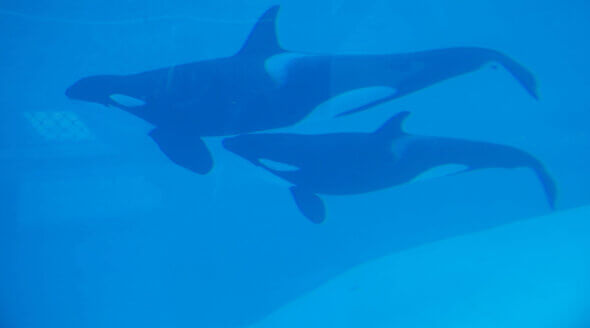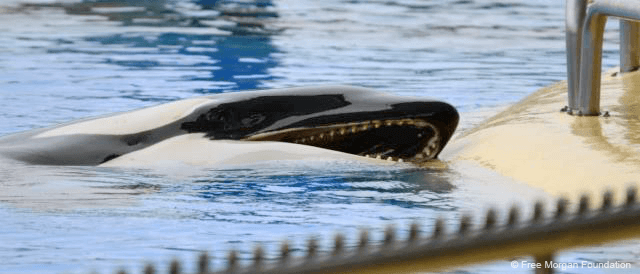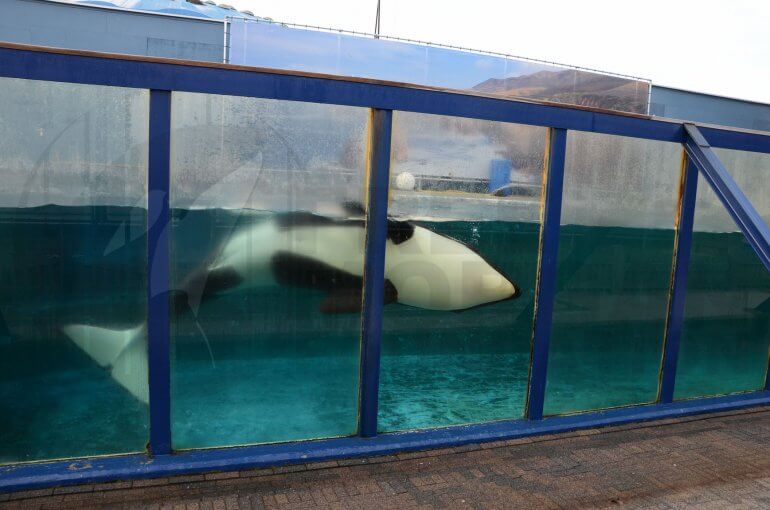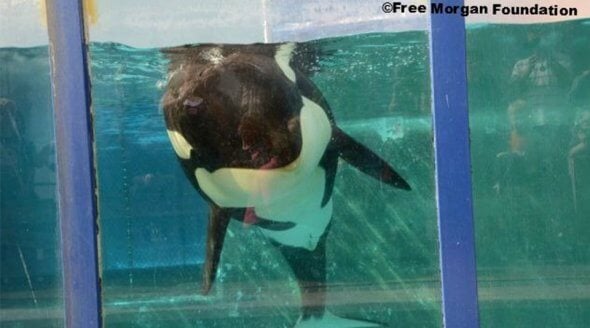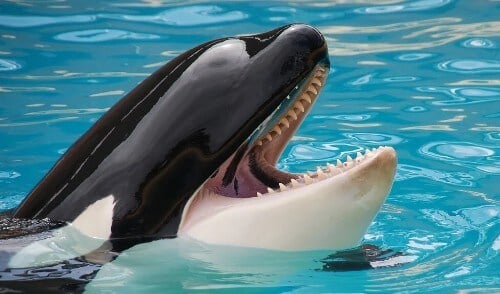Morgan the Orca Is Pregnant Again
Blog update (12 February 2025): Morgan the Orca Is Pregnant Again
It’s devastating that Morgan, who’s been forced to spend over a decade in captivity and lost her first baby a few years ago, is pregnant again. Imprisoned in Loro Parque marine park in Tenerife, Spain, she spends her days in a prison-like tank filled with chemically treated water and is forced to perform tricks for human entertainment.
According to the Free Morgan Foundation, laws prohibit using Morgan for breeding. Yet, Loro Parque has done just that – newborn calves attract more visitors, boosting the park’s profits.
This is tragic news as yet another baby orca will be born in a small concrete tank – a far cry from their natural habitat and without the vital support of their pod.
Make Morgan’s Baby the Last Orca Born in Captivity
Captivity kills, and orcas deserve their freedom. If you want to help Morgan, her future calf, and other orcas suffering in captivity, please never visit any marine park that exploits animals for entertainment.
Tell TUI to Stop Profiting From Morgan’s Misery
TUI, whose animal welfare policy is against breeding cetaceans in captivity for commercial purposes, sells tickets to this watery prison.
Urge TUI to cut ties with this hellhole and other marine abusement parks:
Original blog (11 August 2021) Infant Orca Ula Dies at Loro Parque
Ula – a 2-year-old orca – has died at Loro Parque marine park in Tenerife, Spain.
Ula’s extremely premature death – the second at Loro Parque this year alone – is another grim reminder that these sensitive and intelligent animals don’t belong in captivity.
No matter the cause – which is currently unknown – Ula’s death brings an end to a tragic life full of misery. You don’t need a necropsy to know that the despair, stress, and boredom of confinement to a concrete tank takes an enormous toll on orcas.
More Loro Parque Cruelty
Ula was the calf of an orca named Morgan, who, on 23 June 2010, was found emaciated in the Wadden Sea off the coast of the Netherlands. The Dolfinarium in Harderwijk, the Netherlands, captured her and transported her to its facility under a permit that specifically provided for her recovery and subsequent release. She recovered at the dolphinarium in just a few months.
During this time, a group of experts – the Free Morgan Foundation – compared her unique calls to those of other orcas in the region and found that she most likely belonged to an orca population in the Norwegian Sea. The foundation developed a detailed plan for her rehabilitation, with the intention of reintroducing her to her pod.
However, she was never released back into her ocean home. Instead, with the support of the Dutch government, she was shipped off to Loro Parque, where she’s been held captive for over a decade.
In 2018, Morgan gave birth to Ula, her first calf, who was also imprisoned at Loro Parque until her recent death.
A Life in Captivity
In their natural habitat, orcas normally live between 30 and 50 years. Their maximum life expectancy is between 60 and 70 years for males and between 80 and 90 for females. However, the average age of captive orcas who have died is only about 14 years.
Housed in small concrete tanks, captive orcas swim in endless circles and often break their teeth by gnawing on the concrete sides and metal gates out of stress. Experts have repeatedly identified health problems and psychological distress in the orcas at Loro Parque. Some are missing teeth, and some have rake marks all over their bodies from painful attacks by frustrated tankmates. They float listlessly on the surface of the water, exhibiting behaviour unheard of among wild orcas.
What You Can Do
It’s too late for Ula to have the life she deserved, but Loro Parque can still do the right thing by Morgan. Please urge decision-makers to release her to a coastal sanctuary, where she could spend her remaining days in as natural a setting as possible:
The only reason these highly intelligent and sensitive animals are still suffering in these aquatic prisons is because tourists buy tickets to see them. ABTA, a travel industry trade association, has a list of “Unacceptable and Discouraged Practices” in which it advises against activities such as bullfighting and elephant rides – but why is it OK with letting marine mammals endure a life of misery in watery prisons? If ABTA were to update its list of “Unacceptable and Discouraged Practices” to include facilities that exploit orcas and other marine mammals, this would help reduce the sale of marine park tickets. Please urge ABTA to revise its animal welfare guidelines:

